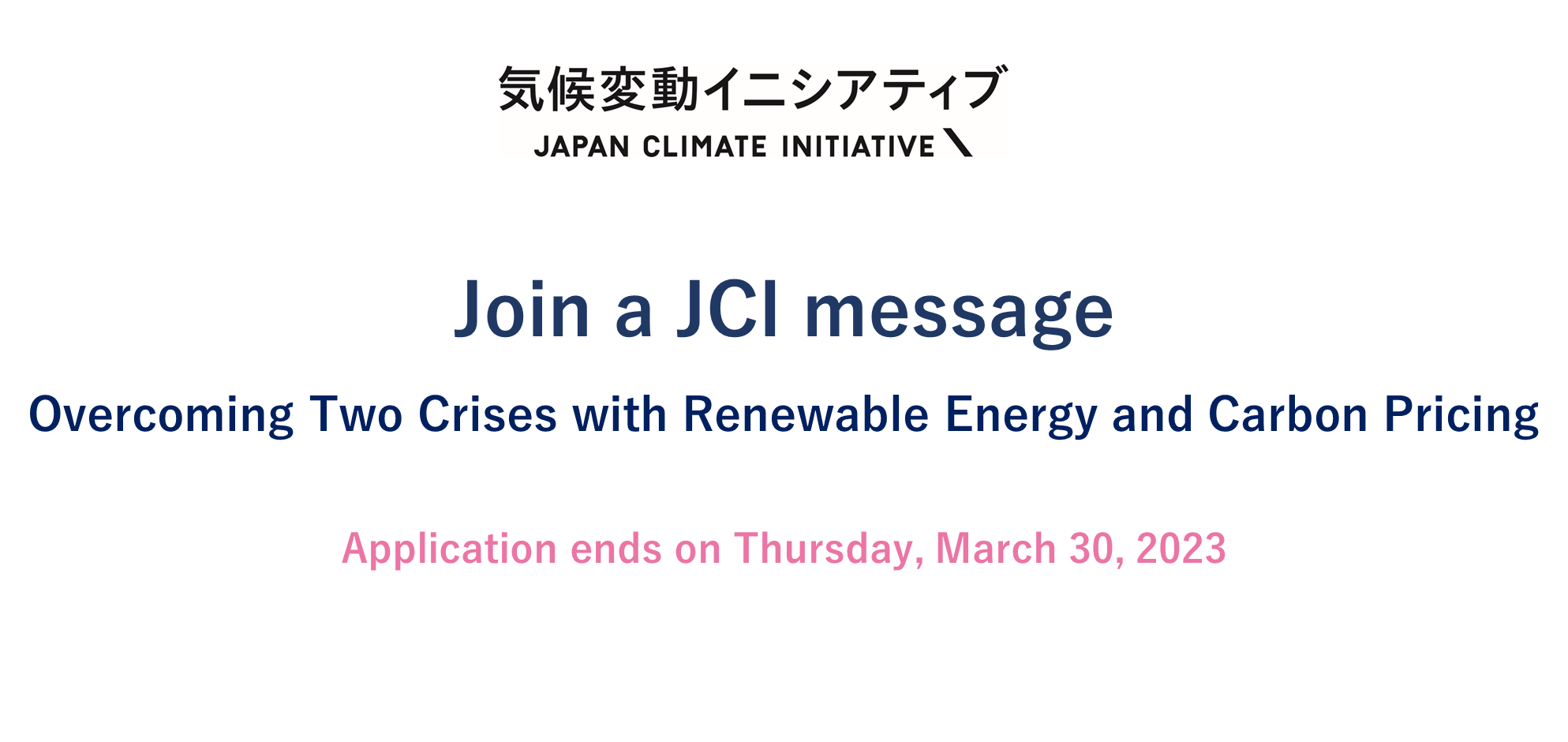
Application is closed on 31th March.
The Japan Climate Initiative (JCI) invites all non-state actors in Japan including as businesses, local governments, NGOs and organizations to endorse the following message (the deadline is on March 30th).
Prior to the G7 Hiroshima Summit held this May, hosted by Japan, the G7 Ministers’ Meeting on Climate, Energy and Environment in Sapporo will be held on April 15 and 16. This ministerial meeting is crucial in terms that it will determine the outlines of strategies for the G7 countries to confront the climate and energy crises that are simultaneously advancing. At that moment, the Japanese government has decided on the “Basic Policy for the Realization of GX”, and intends to implement the energy policies and the introduction of carbon pricing based on the GX basic policy.
JCI will seize this opportunity to call on the Japanese government to further strengthen its climate measures, and to send a joint message to the world to convey the efforts of Japanese companies, local governments, NGOs, and other organizations.
The names of supporting organizations will be announced on this website and released in mid-April, and the message will also be disseminated through domestic and international media and submitted to the government.
We look forward to recieving as many endorsements from non-state actors in Japan as possible.
Please click here to see how to endorse the message. (Japanese only)
PDF version of the message is HERE
JCI’s Message to the World on the Occasion of the G7 Summit in Japan
Overcoming Two Crises with Renewable Energy and Carbon Pricing
The world is now facing two crises: the climate crisis and the energy crisis. We, Japanese non-state actors including companies, local governments, NGOs, and others participating in the Japan Climate Initiative, call on the Japanese government to reduce dependence on fossil fuels such as coal and overcome the two crises by accelerating the deployment of renewable energy and introducing effective carbon pricing as soon as possible. We will also take the lead in taking action.
Supply the vast majority of electricity from renewable energy sources by 2035
At the G7 Summit in May last year, the G7 nations set a common goal of achieving a fully or predominantly decarbonized electricity supply by 2035. While Japan’s current Basic Energy Plan aims for 36-38% of its electricity from renewable energy sources by 2030, four G7 countries (Canada, Germany, the United Kingdom, and Italy) already derive more of their electricity from renewable energy sources than Japan’s 2030 target calls for. In addition to these four countries, renewable energy is expected to account for most of the electricity supply in the U.S. by 2035.
We call on the Japanese government to not only achieve the current 2030 target, but also to introduce effective measures and implement regulatory reforms to accelerate the introduction of renewable energy, such as accelerating the development of both bottom-fixed and floating offshore wind farms and making the installation of solar power generation mandatory for new buildings, so that the vast majority of electricity will come from renewable energy sources by 2035.
As the two crises progress, the shift from soaring fossil fuel costs to low-cost renewable energy has become an even more rational choice, and the use of PPA is seeing rapid growth in Japan. JCI members will continue to develop and use renewable energy that is new& additional, and sustainable, making the best use of these methods including PPA.
Early introduction of effective carbon pricing
The International Energy Agency reported that carbon prices in developed countries should be USD 130/tCO2 in 2030 to achieve net zero in 2050. The Japanese government has indicated in its “Basic Policy for the Realization of GX” that it intends to introduce carbon pricing, but the carbon levy will not be introduced until FY2028, and the emissions trading system will remain voluntary for the next 10 years. Also, the carbon price level that can be estimated based as a result of this policy will be only one-tenth of the IEA’s recommendation.
We call on the Japanese Government to introduce a carbon pricing system that will see tangible outcomes earlier than currently planned to ensure that Japan’s 2030 emission reduction target is met and further enhanced, and that Japanese companies’ sincere efforts to decarbonize are duly recognized internationally as decarbonization becomes the rule for global business transactions, including the introduction of carbon border adjustment measures.
Standing at the forefront of the global challenge to achieve the 1.5℃ goal
We believe that Japan should and can play a greater role in the global effort to overcome the climate crisis. We at JCI are committed to pioneering emission reductions and deepening collaboration among non-state actors in Japan and abroad to serve as a bridge between Japan and the rest of the world.
Japan Climate Initiative (JCI), April, 2023
■related JCI’s messages published before
Now is the time to accelerate renewable energy deployment: Calling for stronger climate change action in the midst of the fossil energy (July, 2022)
JCI’s Statement to Call for an Ambitious 2030 Target for Japan to Realize the Paris Agreement Goal (April, 2021)
92 corporations calling on the Japanese government to raise its 2030 renewable energy target to 40-50% (January, 2021)